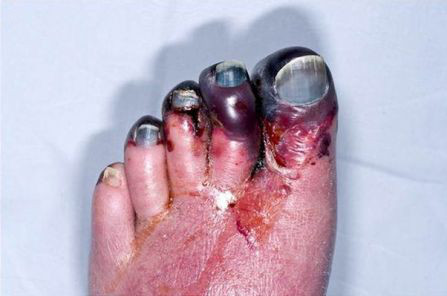Resumo
Определение
Анамнез и осмотр
Ключевые диагностические факторы
- presencia de factores de riesgo
- antecedentes de exposición reciente a la heparina
- antecedentes de TIH
- ausencia de enfermedades y medicamentos que causan trombocitopenia
- antecedentes de cirugía o traumatismo recientes
- características consecuentes con un evento tromboembólico venoso o arterial (p. ej., embolia pulmonar [EP], trombosis venosa profunda [TVP], accidente cerebrovascular, infarto de miocardio [IM]).
- necrosis en los lugares de las inyecciones de heparina
Другие диагностические факторы
- ausencia de sangrado
- signos de necrosis hemorrágica suprarrenal
- reacción sistémica aguda
- signos de gangrena venosa en las extremidades
Факторы риска
- exposición reciente a la heparina (dentro de los últimos 100 días)
- cirugía cardiovascular u ortopédica reciente
- sexo femenino
Диагностические исследования
Исследования, которые показаны в первую очередь
- hemograma completo (HC)
Исследования, проведение которых нужно рассмотреть
- Índice 4T
- ensayo con antígenos de trombocitopenia inducida por heparina (TIH)
- Ensayo funcional de TIH
- estudios de coagulación
- ultrasonido Doppler venoso
- angiografía pulmonar por tomografía computarizada (APTC)
- gammagrafía de ventilación-perfusión, (gammagrafía de V/P)
- flebografía por tomografía computarizada cerebral
- venografía por resonancia magnética (cabeza)
Алгоритм лечения
sospecha de TIH con índice 4T ≥4, o TIH aguda confirmada
sospecha de trombocitopenia inducida por heparina (TIH) con índice 4T ≤3
recuperación plaquetaria (TIH A subaguda)
TIH remota
Составители
Авторы
Lori-Ann Linkins, MD, MSc(Clin Epi), FRCPC
Associate Professor
Department of Medicine
McMaster University
Thrombosis Consultant
Juravinski Hospital and Cancer Centre
Hamilton
Ontario
Canada
Раскрытие информации
LL is an author of several references cited in this topic.
Рецензенты
Jeffrey S. Wasser, MD
Assistant Clinical Professor of Medicine
Acting Associate Chair of the Division of Hematology and Medical Oncology
University of Connecticut School of Medicine
Farmington
CT
Раскрытие информации
JSW declares that he has no competing interests.
Henry Watson, MD, FRCP, FRCPath
Consultant Haematologist
Aberdeen Royal Infirmary
Foresterhill Health Campus
Aberdeen
UK
Раскрытие информации
HW declares that he has no competing interests.
Simon Davidson, MPhil
Clinical Scientist
Royal Brompton Hospital
Honorary Clinical Lecturer
Imperial College London
London
UK
Раскрытие информации
SD is a consultant for Mitsubishi Pharma, the manufacturer of argatroban.
Peer reviewer acknowledgements
BMJ Best Practice topics are updated on a rolling basis in line with developments in evidence and guidance. The peer reviewers listed here have reviewed the content at least once during the history of the topic.
Disclosures
Peer reviewer affiliations and disclosures pertain to the time of the review.
Список литературы
Основные статьи
Warkentin T, Kelton J. Temporal aspects of heparin-induced thrombocytopenia. N Engl J Med. 2001;344:1286-1292.Полный текст Аннотация
Cuker A, Arepally GM, Chong BH, et al. American Society of Hematology 2018 guidelines for management of venous thromboembolism: heparin-induced thrombocytopenia. Blood Adv. 2018 Nov 27;2(22):3360-92.Полный текст Аннотация
Linkins LA, Dans AL, Moores LK, et al. Treatment and prevention of heparin-induced thrombocytopenia: antithrombotic therapy and prevention of thrombosis (9th ed). American College of Chest Physicians evidence-based clinical practice guidelines. Chest. 2012 Feb;141(2 Suppl):e495S-e530S.Полный текст Аннотация
Watson H, Davidson S, Keeling D, et al. Guidelines on the diagnosis and management of heparin-induced thrombocytopenia: second edition. Br J Haematol. 2012 Dec;159(5):528-40.Полный текст Аннотация
Статьи, указанные как источники
A full list of sources referenced in this topic is available to users with access to all of BMJ Best Practice.

Отличия
- Estado postoperatorio
- Púrpura trombótica trombocitopénica
- Púrpura trombocitopénica inducida por fármacos
Больше ОтличияРекомендации
- Guidelines for management of venous thromboembolism: heparin-induced thrombocytopenia
- Treatment and prevention of heparin-induced thrombocytopenia (9th ed)
Больше РекомендацииВойдите в учетную запись или оформите подписку, чтобы получить полноценный доступ к BMJ Best Practice
Использование этого контента попадает под действие нашего заявления об отказе от ответственности